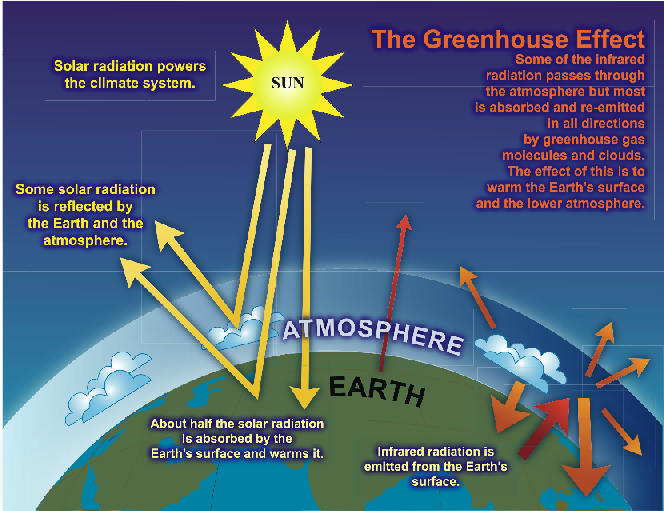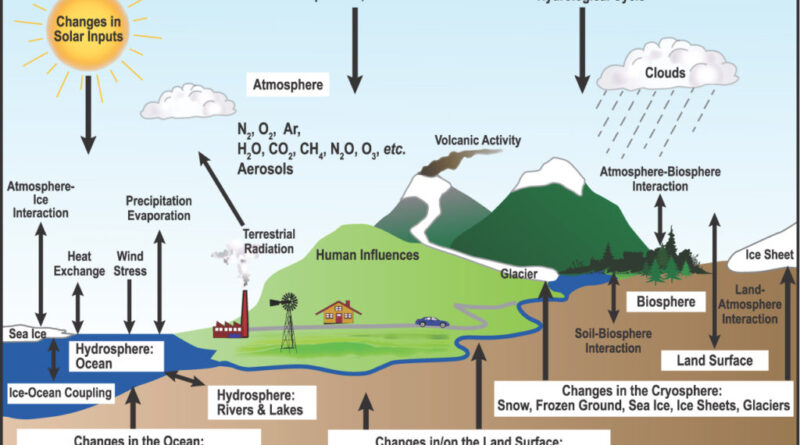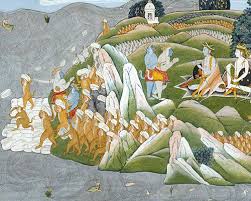How does climate change affect the environment? 24
Climate change
One of the biggest problems facing our world right now is climate change. As a result of human activities including the combustion of fossil fuels, deforestation, and industrial processes, the Earth’s climatic patterns have undergone profound and long-lasting changes. Global warming and other negative environmental effects result from these activities’ increased atmospheric concentration of greenhouse gases like carbon dioxide and methane.

Every facet of the environment is impacted by the extensive effects of climate change. Weather disasters such as storms, droughts, and heatwaves are becoming more common and severe due to rising temperatures. Rising sea levels endanger coastal ecosystems and communities as a result of melting glaciers and polar ice caps.
Furthermore, ecosystems that support a variety of plant and animal species are threatened by shifting climatic conditions, which also lower biodiversity.
The world must work together to combat climate change. By utilizing renewable energy sources, increasing energy efficiency, and putting into practice sustainable forestry and agriculture methods, it entails lowering greenhouse gas emissions. The requirement for adaptation measures to assist communities in coping with the effects already being felt is equally crucial.
We can strive toward a more resilient and sustainable future for our world by becoming aware of the science underlying climate change and by adopting proactive measures.
Follow our Digiknowledge.co.in page for the latest updates about technology, bikes, cars, sports, lifestyle, and many more.
What is Climate Science and Types of Climate Change?
The study of Earth’s climate system, which includes the atmosphere, seas, and land surfaces, as well as their interactions, is known as climate science. It entails comprehending the elements—both natural and man-made—that affect the patterns and unpredictability of the climate. Long-term variations in temperature, precipitation, and other atmospheric parameters are referred to as climate change.
There are two primary types of climate change:
Anthropogenic (caused by humans) climate change, which is mostly brought on by rising greenhouse gas emissions from activities like burning fossil fuels and deforestation,
Natural climatic variability, which is brought on by events like solar cycles and volcanic eruptions,.
What are the Effects of Climate Change on Our Planet?
The effects of climate change on our world are extensive and profound. Among them are:
An increase in Earth’s average surface temperature brought on by a rise in greenhouse gas concentrations is known as global warming.
Extreme weather events include heat waves, droughts, severe rainfall, and hurricanes that occur more frequently and intensely.
Sea Level Rise: Coastal areas are at risk due to increasing sea levels brought on by the melting of polar ice caps and glaciers.
Reduced Biodiversity: As a result of habitat disruption brought on by climate change, there is a loss of species.
Ocean acidification: The oceans’ increased absorption of CO2 causes acidification, which has an impact on marine life.
Impact on Agriculture: Modifications in climate patterns have an impact on crop output and food security.
Health Risks: Respiratory problems, heatstroke, and vector-borne infections are all made worse by elevated heat and pollution levels.
What is Global Warming?
The long-term heating of the Earth’s climate system that has been seen since the pre-industrial era (between 1850 and 1900) is known as global warming. It is caused by human activity, mainly the burning of fossil fuels, which raises the atmospheric concentration of greenhouse gases.
What is the climate crisis?
Climate change poses an urgent and increasing threat to ecosystems, businesses, and communities across the globe. These effects are collectively referred to as the “climate crisis.” To mitigate and adjust to these changes, it emphasizes the necessity of taking swift, decisive action.
What are the causes of climate change?
Climate change is mostly caused by the following:
Emissions of greenhouse gases caused by burning fossil fuels for transportation, heat, and electricity.
The planet’s ability to absorb CO2 is decreased by deforestation.
Industrial operations: emissions of greenhouse gases and contaminants.
Methane and nitrous oxide, two strong greenhouse gases, are produced by agricultural practices.
Garbage Management: As organic garbage breaks down in landfills, methane is released into the atmosphere.
How do we prevent climate change?
Both adaptation and mitigation techniques are necessary to stop climate change.
Adopting renewable energy sources like solar, wind, and hydro will help reduce greenhouse gas emissions.
Increase energy efficiency in industries, buildings, and transportation.
Planting trees in order to absorb CO2 is known as reforestation and amending.
Reducing emissions and improving carbon sequestration through the use of sustainable agriculture practices.
Reduction of Waste: To cut methane emissions, enhance recycling and waste management.
IPCC Report on Climate Change
The reports published by the Intergovernmental Panel on Climate Change (IPCC) offer thorough evaluations of the causes, consequences, and possible hazards associated with climate change from a scientific standpoint. The reports provide ideas for adaptation and mitigation as well.
According to the most recent reports, cutting emissions is crucial to preventing catastrophic effects and keeping global warming to 1.5°C above pre-industrial levels.
Climate Action
Actions performed to lower greenhouse gas emissions and increase resistance to climate-related effects are referred to as climate action. This covers programs and policies aimed at advancing sustainable behaviors, improving energy efficiency, and advancing renewable energy at the local, national, and international levels.
What are the 10 ways to reduce climate change?
- By adopting following steps , we can help reduce climate change
- Make the Switch to Renewable Energy: Get your electricity from wind, solar, or other renewable sources.
- Upgrade to energy-efficient appliances and enhance insulation in your home to increase energy efficiency.
- Less waste and material recycling are the three R’s: reduce, reuse, and recycle.
- Reduce your driving: walk, bike, carpool, or take public transportation.
- Consume Less Meat: Cutting back on meat intake will help reduce methane emissions.
- Encourage sustainable practices by purchasing locally and sustainably made goods.
- Use water-saving fixtures and cut down on waste to conserve water.
- Encourage lawmakers who are supportive of climate change policies.
- Inform Others: Spread the word about the causes of climate change and possible remedies.
- Diminish Your Own Carbon Footprint: Determine how much carbon you yourself emit and make lifestyle adjustments to cut it.
Conclusion on Climate Change
One of the biggest problems of our day is climate change, which has profound effects on the environment, human health, and international economies. Climate change has brought about extreme weather, rising sea levels, loss of biodiversity, and global warming.
It is mostly the result of human activity, such as the burning of fossil fuels, deforestation, and industrial processes.
Reducing greenhouse gas emissions by using renewable energy sources, improving energy efficiency, and putting into practice sustainable forestry and agriculture practices is essential to lessening the effects of climate change.
Moreover, communities need adaptation techniques to help them deal with the changes that are currently happening.



